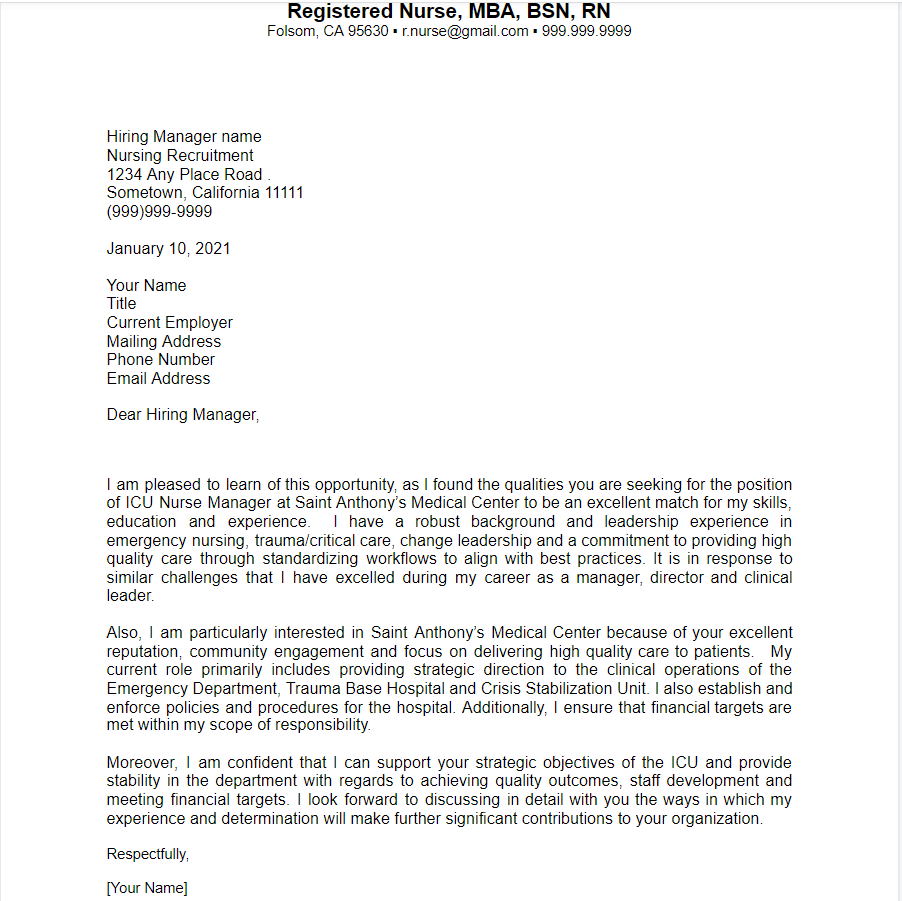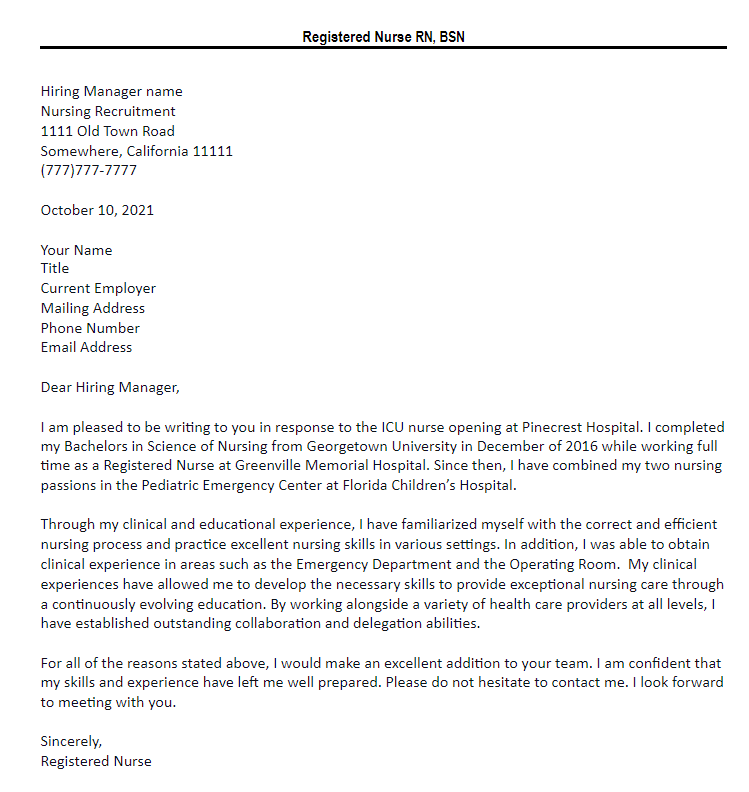

Writing an effective nursing cover letter may seem unnecessary–trust us: it’s not. Roughly 45% of job seekers send resumes without a cover letter. Yet, a majority of employers prefer cover letters to go with a resume.
When looking for a new job, nurses often spend the most time developing their resumes. Sometimes they neglect their cover letters or don’t write one at all.
Whether you are a new grad nurse or a nurse veteran, a good cover letter is a great way to separate yourself from the pack. Even if a hiring manager only skims it, it can mean the difference between you and another candidate getting the job if something catches their eye.
In this post, we will explore the following:
AI-powered resume builder for nurses.
With the right care and effort, you can craft a professional nursing cover letter that helps distinguish you from other candidates.
We’ve provided two sample nurse cover letters and a template to help give you an idea of what to write.


Hiring Manager name
Nursing Recruitment
1234 Any Place Road
Sometown, California 11111
(999)999-9999
Your Name
Title
Current Employer
Mailing Address
Phone Number
Email Address
Dear Hiring Manager,
I am pleased to learn of this opportunity, as I found the qualities you are seeking for this position to be an excellent match for my skills, education, and experience.
I have a robust background and leadership experience in emergency nursing, trauma/critical care, change leadership, and a commitment to providing high-quality care through standardizing workflows to align with best practices. It is in response to similar challenges that I have excelled during my career as a manager, director, and clinical leader.
Also, I am particularly interested in [the company] because of your excellent reputation, community engagement, and focus on delivering high-quality care to patients. My current role primarily includes providing strategic direction to the clinical operations of the Emergency Department, Trauma Base Hospital, and Crisis Stabilization Unit. I also establish and enforce policies and procedures for the hospital. Additionally, I ensure that financial targets are met within my scope of responsibility.
Moreover, I am confident that I can support your strategic objectives of the ICU and provide stability in the department with regard to achieving quality outcomes, staff development, and meeting financial targets. I look forward to discussing in detail with you the ways in which my experience and determination will make further significant contributions to your organization.
Respectfully,
[Your Name]
Here are the most common scenarios when a nursing cover letter is required:
Knowing you are the best candidate for the job and proving it are two different things. You may have an impeccable nursing resume; however, 20 other candidates are applying for the same position.
Nursing careers are in demand, but that does not mean there isn’t competition for specific nursing positions such as a nurse practitioner or nurse educator.
Resumes are neatly spun packages of information about a candidate’s education, job history (when applicable), and professional certification. They leave little room for information about who you are as a candidate.
That is where a good cover letter comes in. With the proper cover letter format, your cover letter will offer several advantages and is a great way to showcase your nursing skills.
Resumes indicate your worth. Cover letters reveal your intent. Outline how your desires and skills align with the job you are applying for. This shows the hiring manager you are interested in the position.
Hopefully, it’s not going to be just another job for you. It will become part of your mission and vision as a nursing professional. For instance, if a position will help grow your leadership skills and prepare you for an advanced nursing career, state that as part of the intent.
Your education and credentials make up only a small portion of who you are as a nursing professional. How someone looks on paper is not an indicator of how they will perform. It does not accurately gauge their character.
In that sense, a cover letter provides a sample of what the hiring manager will expect in the interview.
Using a cover letter to honestly explore your strengths, weaknesses, experiences, interests, and perspectives is an asset. Maybe your resume includes a certification or award you are proud of. Expand on it in the cover letter.
Pro-tip: Using some of the traits and terms found in the job’s job description is a great way to stand out as a candidate, as it shows you have the qualities the employer is looking for.
What makes you proud of that achievement and how does it make you the best candidate for the position?
Hiring professionals suggest resumes span one page for new nurses and those with less than 10 years of experience. Due to length limits, it is hard to explain any gaps in work history. Also, resumes leave out room for detailing why you may have shifted gears from an earlier career into nursing.
A cover letter provides the perfect opportunity to explain these situations.
Cover letters add an extra touch to a job application. As stated, nearly half of all job applicants fail to include a cover letter with their job applications unless requested.
Going that extra mile shows a hiring manager that you are willing to put the work in to get the job done right. That is a desirable quality for any business or industry, especially in nursing and other healthcare careers.
Remember that a cover letter should focus on a resume’s highlights, fleshing them out in a more meaningful way.
Include only information that falls into one of the four benefits listed above to get the most mileage out of your cover letter.